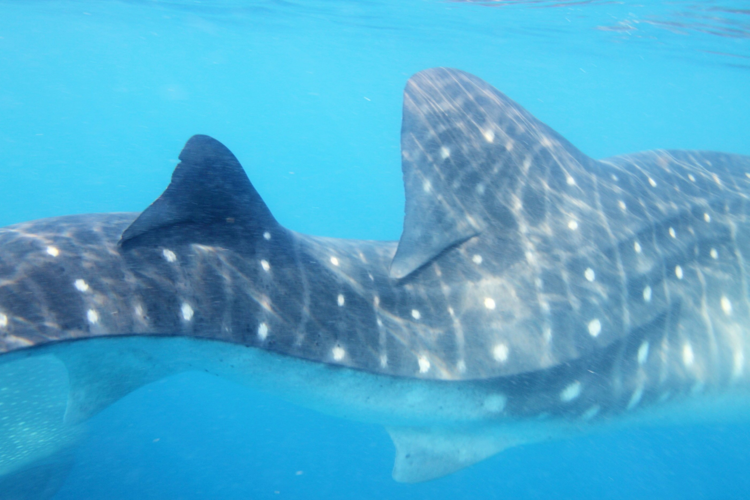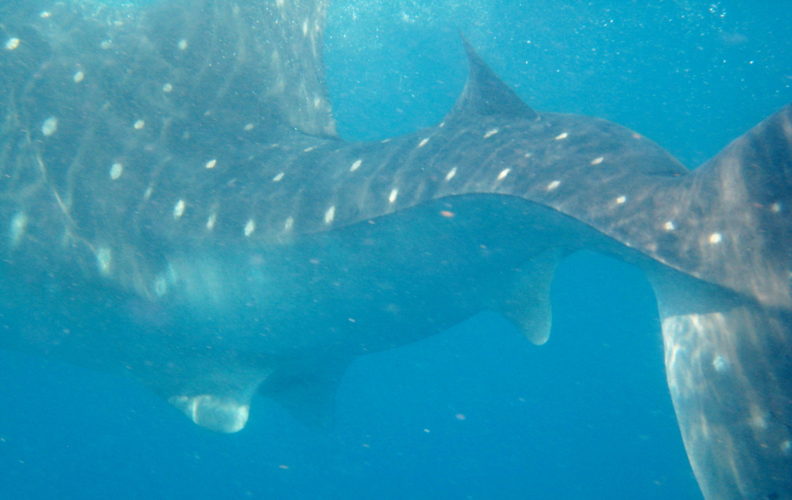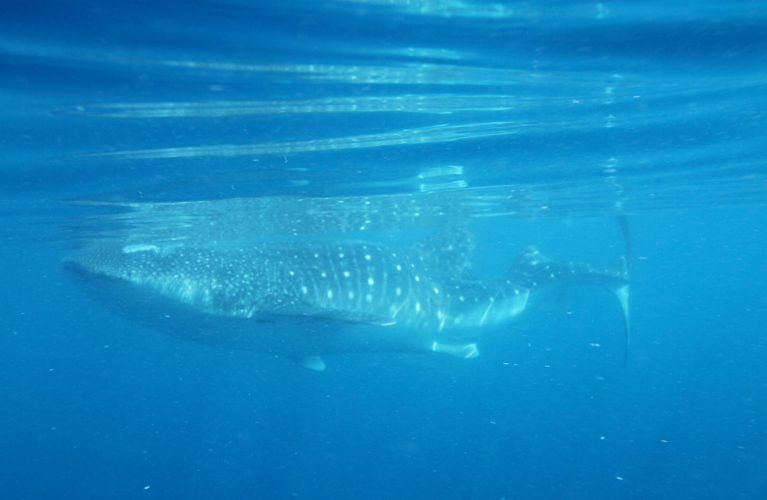By Michael Lee Simpson
Marine biologists have documented the first case of a whale shark surviving with a severe spinal deformity.
The finding centers on a 20-foot whale shark first encountered in 2010 at Ewing Bank, a known aggregation site off the Louisiana coast in the Gulf of Mexico.
What makes this case extraordinary is not just the severity of the spinal curvature, but the animal's apparent ability to thrive despite the condition.
Although last seen eight years ago, a study published in November 2024 is now offering groundbreaking insights into how a whale shark with severe spinal deformities can survive.
"To see such a large animal surviving with a spinal deformity like that is extremely rare," said Eric Hoffmayer, 50, a research fisheries biologist with the National Marine Fisheries Service who led the study.
"Typically, those types of deformities are not compatible with life. Usually, you see more examples of it in embryonic animals."

(Louisiana Wildlife & Fisheries via SWNS)
The research team first photographed the whale shark during a tagging expedition when they encountered a large aggregation of more than 100 animals feeding on little tunny fish eggs.
Three years later, researchers returned to the same location and remarkably re-encountered the same shark, confirmed through its unique spot pattern.
"We were back out there and we re-encountered the animal, took some more photographs to verify that it was the same animal by matching up the spot pattern," Hoffmayer, from Pascagoula, Mississippi, said.
"We actually put a satellite tag on it and figured, well, let's learn more about this animal since it's unique that we've encountered it twice now."
The satellite tracking data provided crucial insights into how the spinal deformity affected the shark's behavior and survival. Despite the obvious physical impairment, the tagged whale shark exhibited surprisingly normal patterns.
"When we first encountered the animal, it was very clear that something was off," Hoffmayer said.

(Louisiana Wildlife & Fisheries via SWNS)
"Watching the animal swim, it obviously impacted its swimming, but because these animals feed on plankton, it still could maintain a certain swimming motion and speed that appears to have limited impacts on its daily habits."
Researchers believe the whale shark's feeding strategy may be key to its survival.
Unlike predatory sharks that must chase fast-moving prey, whale sharks are filter feeders that consume plankton and small fish by swimming slowly with their mouths open.
"If it were an animal that was feeding on fast prey, it really would have struggled and probably wouldn't have survived as long," Hoffmayer said.
The satellite tag data revealed that the deformed whale shark's daily swimming speeds, temperature preferences, and depth preferences all fell within normal ranges compared to healthy individuals in the region.
"What was really interesting was when we put the tags on, we were able to collect data on daily swimming speed, temperature preferences, depth preferences, and everything seemed to fall in line with the other sharks that we tagged in the region that didn't have the spinal deformity," Hoffmayer said.

(Louisiana Wildlife & Fisheries via SWNS)
Researchers believe the condition was likely congenital rather than caused by trauma such as a boat strike.
This assessment was supported when another scientist contacted Hoffmayer after the publication of his paper, sharing images of a smaller whale shark with a similar spinal deformity.
The whale shark, estimated to be between 15 and 20 years old when tagged, has not been seen since 2013.
But this isn't unusual for the species, which typically inhabits offshore waters and can live 75 to 100 years or more.
"This animal's got this deformity, but it's been able to overcome it and still maintain its normal behavior and feeding habits," Hoffmayer said.
"Looking at the movements and behaviors, this appears to be pretty close to normal."
He added: "It's been able to overcome this spinal deformity and still do the everyday things that whale sharks do, which is really remarkable."























(0) comments
Welcome to the discussion.
Log In
Keep it Clean. Please avoid obscene, vulgar, lewd, racist or sexually-oriented language.
PLEASE TURN OFF YOUR CAPS LOCK.
Don't Threaten. Threats of harming another person will not be tolerated.
Be Truthful. Don't knowingly lie about anyone or anything.
Be Nice. No racism, sexism or any sort of -ism that is degrading to another person.
Be Proactive. Use the 'Report' link on each comment to let us know of abusive posts.
Share with Us. We'd love to hear eyewitness accounts, the history behind an article.